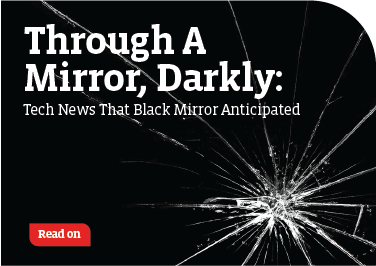 When a newer television anthology gets compared to an institution as groundbreaking as The Twilight Zone, it’s natural to assume that the hype machine is overstating the case. But Black Mirror, which debuted in 2011 in the U.K. and on Netflix in 2014 in the U.S., is one of the rare instances in which the publicity matches up with the reality. With The Twilight Zone, Rod Serling and a stable of top science fiction writers deftly wove the pertinent fears and moral conflicts of the 1950s into timeless works of speculative fiction – giving viewers a weekly dose of fictional futures that oftentimes double as clear commentary on the present. In today’s world of rapid technological change, Charlie Brooker’s Black Mirror manages to fill the same role.
When a newer television anthology gets compared to an institution as groundbreaking as The Twilight Zone, it’s natural to assume that the hype machine is overstating the case. But Black Mirror, which debuted in 2011 in the U.K. and on Netflix in 2014 in the U.S., is one of the rare instances in which the publicity matches up with the reality. With The Twilight Zone, Rod Serling and a stable of top science fiction writers deftly wove the pertinent fears and moral conflicts of the 1950s into timeless works of speculative fiction – giving viewers a weekly dose of fictional futures that oftentimes double as clear commentary on the present. In today’s world of rapid technological change, Charlie Brooker’s Black Mirror manages to fill the same role.
What Cold War paranoia and nuclear annihilation were to The Twilight Zone, mass communication and the fast pace of technological change are to Black Mirror. Not to mention there’s a generous helping of farther-future fables – perennial cyberpunk speculation on what it means to be human in virtual worlds, updated with an iPhone aesthetic. It’s television that entertains as much as it tells us something about ourselves, and with each passing year it seems as though there are handful of real-life events that fans can’t help but point to as Black Mirror moments – where the world seems to be referencing Black Mirror rather than the opposite.
In the wake of Black Mirror’s interactive film Black Mirror: Bandersnatch, let’s examine three recent tech stories that came eerily close to events on the show.
“Nosedive” and China’s Social Credit Score
While some Black Mirror episodes are uncompromisingly dark, season three’s first episode “Nosedive” gave use a view of a kinder, gentler dystopia. The main character, Lacie, lives in a world in which every interaction between people gets its own star rating. In this pastel panopticon, dropping beneath a certain rating negatively impacts where you can live, work and travel. A few chance encounters as she sets out on a rating-boosting trip to a childhood friend’s wedding send her down a spiral to the bottom of the social milieu.
Plenty of fans saw an eerie overlap between this world of ever-smiling, star-rating hungry Stepford folk and today’s real world, where cutting a poor figure on social media can doom businesses and even ruin relationships. But the 2018 media focus on China’s social credit system showed us that “Nosedive” may – by the year 2020 – be even more of a reality in some parts of the world. Indeed, reports indicate that based on some elements of social credit now being consolidated by the Chinese government, citizens have already been deprived rights such as traveling, renting hotels and using credit cards.
China’s plan has been decried as chilling, arbitrary and downright creepy, and has also raised eyebrows among critics who have wondered if Western governments aren’t at risk of meandering into the same territory – and if there needs to be something done to stop it from heading in that direction. If we imagine a world in which having a dissident opinion – or a bad day – can impact, for instance, our right to go grocery shopping, we find “Nosedive” to be a rare occasion in which Black Mirror is lighter than the world it reflects.
“Metalhead” and 2018’s Laws about LAWs
One of the most stylistically distinct Black Mirror episodes, “Metalhead” is a piece of science fiction shot like an old-school horror movie. A woman in a post-apocalyptic future is on the run from a killer AI. But the robot-run future of “Metalhead” isn’t the full-on, chaotic, bombs-away nightmare that Terminator fans associate with a self-aware Skynet. Rather it’s one where simple, dog-like androids chase down their prey in dogged pursuit – with every movement they make aimed at the singular goal of tracking and killing. The sparse look and feel of the episode seem to drive the point home – a robot that just won’t stop coming is classically horrific; as scary as a real-life Michael Meyers or Jason Voorhees.
At the time the episode was made, Boston Dynamics had already demoed some robots with animal-like ambulation on which the in-show androids were based – though it’s worth noting that the non-fictional ones are friendly. Today, governments and human rights groups have begun to take lethal autonomous weapons (LAWs) the likes of which appeared on “Metalhead” very seriously. They’ve been instituting bans and considering legislation to make sure that such unaccountable, undefeatable weapons don’t become commonplace.
“The Entire History of You” and Memory Implant Advancements
In a particularly gripping early Black Mirror episode, “The Entire History of You,” people live in a world in which an implant allows people to record their lives as they live them and review their “memories” as they would watch a movie – an exact, unchanging records of the events as they occurred – even projecting them on a screen. When a character named Liam begins to suspect his wife of infidelity, the new technology adds a next-gen twist to the all-too-human jealousy, deception and paranoia that unfold.
While we might not ever get true memory implants quite like what appears in the episode, a 2018 article revealed that tech-enabled memory boosting implants are not solely in the realm of science fiction. And as Black Mirror demonstrates, while such technologies have the obvious potential to fix problems we’d never imagined we could fix, they could likewise impact the social order in ways quite unforeseen and frightening.
While it’s doubtful we’ll come up with cut-and-dry answers on philosophical questions like what it means to technologically enhance, augment or even store our memories, it does seem likely that Brooker can still stay a few steps ahead of the technological landscape for another season or two – a fifth season is in development. But a show can’t stay relevant forever, can it? Not unless this is San Junipero…
Click here to read about ranking emerging technologies and hear from an insightful technologist who spoke at our CompTIA Communities and Councils Forum (CCF) last year and click here to register for the second annual CCF scheduled March 11 to 13 in Chicago, at which we'll be discussing how tech companies of all sizes can get us over the future gap to accomplish the amazingly convenient life science fiction has long promised us.
Matthew Stern is a freelance writer based in Chicago who covers information technology, retail and various other topics and industries.

 Add CompTIA to your favorite RSS reader
Add CompTIA to your favorite RSS reader

